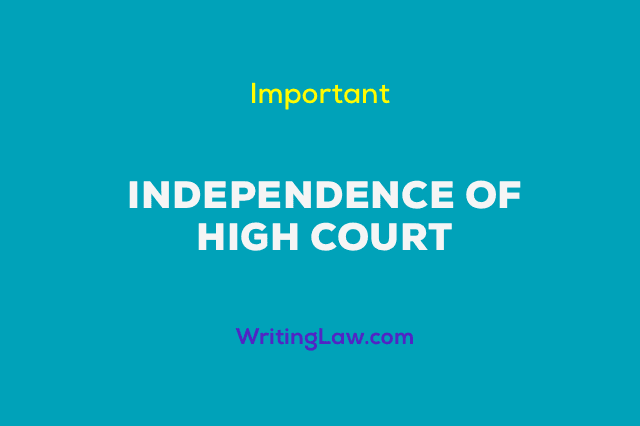
The judiciary at the state level consists of a High Court and multiple subordinate courts. The Constitution of India provides for High Court for each state. For the proper functioning of the state’s legal mechanism, it is essential that the High Court is independent and impartial.
High Court is the highest criminal court of the state. It is the protector of the citizen’s fundamental rights. A person can directly approach the High Court in case of violation of their fundamental rights. The High Court has the power to withdraw cases pending before subordinate court if it involves a question of law. High Court is enshrined with original, appellate as well as writ jurisdiction.
Currently, as of 2021, there are 25 High Courts in India. The territorial jurisdiction of a High Court corresponds to the territory of a state. The Parliament can extend or exclude the High Court’s jurisdiction to any Union Territory.
10 Constitutional Provisions due to which High Courts are Independent and Impartial
The independence of the High Court is essential for the effective discharge of its duties. These are the ten constitutional provisions that ensure the independence and impartial functioning of the High Court.
- Appointment of High Court judges.
- Security of tenure.
- Fixed service conditions.
- Expenses charged on the consolidated fund.
- The conduct of judges cannot be discussed.
- Ban on practice after retirement.
- Power to punish for its contempt.
- Freedom to appoint its staff.
- Jurisdiction of the High Court cannot be curtailed.
- Separation from the executive.
Let us learn more about the above ten points that ensure the Indian High Court’s independence.
1. Appointment of High Court judges.
The judges of the High Court are appointed by the President. And the High Court Chief Justice is appointed by the President after consulting the Chief Justice of India and the Governor of the concerned state. This curtails the absolute discretion of the executive. This also ensures no political considerations or influence.
2. Security of tenure.
The tenure of the judge of the High Court is not fixed. A High Court judge can be removed from his office by the President on the recommendation of the Parliament only on the grounds provided in the Constitution. This means they do not hold the office at the pleasure of the President.
3. Fixed service conditions.
The salaries, allowances, leave, privileges, and pension of the High Court judges are determined by the Parliament. They cannot be changed after their appointment (except during a financial emergency).
4. Expenses charged on the consolidated fund.
The salaries and allowances of the High Court judges are charged on the state’s consolidated fund, but the pension of the High Court is charged on the consolidated fund of India. The salaries, allowances and pension of the staff and the administrative expenses of the High Court are also charged on the state’s consolidated fund (hence non-votable by the state legislatures).
5. The conduct of judges cannot be discussed.
The conduct of the High Court judges concerning the discharge of their duties cannot be discussed in the Parliament or State Legislature. However, an impeachment motion can be discussed.
6. Ban on practice after retirement.
After retirement, the permanent judges of a High Court are prohibited from pleading or acting in court or before any authority in India except Supreme Court and any other High Court. This makes sure that they do not favour anyone in the hope of future assistance.
7. Power to punish for its contempt.
A High Court can punish any person for its contempt. This ensures the authority, dignity and honour of the High Court.
8. Freedom to appoint its staff.
The Chief Justice can make the appointment of the High Court officers and servants of the High Court without any interference from the executive.
9. Jurisdiction of the High Court cannot be curtailed.
Neither the Parliament nor the state legislatures can curtail the jurisdiction or powers of the High Court as specified in the Constitution. But in other respect, powers and jurisdiction can be altered.
10. Separation from the executive.
The state is directed through Article 50 of the Constitution of India to take steps to separate the judiciary from the executive in state public services.
- What Is a Foreign Judgement and When It’s Not Binding in India - 26th July 2022
- What Are Second Appeals Under Civil Law - 23rd June 2022
- Civil Appeal as Per the Civil Procedure Code - 12th June 2022







